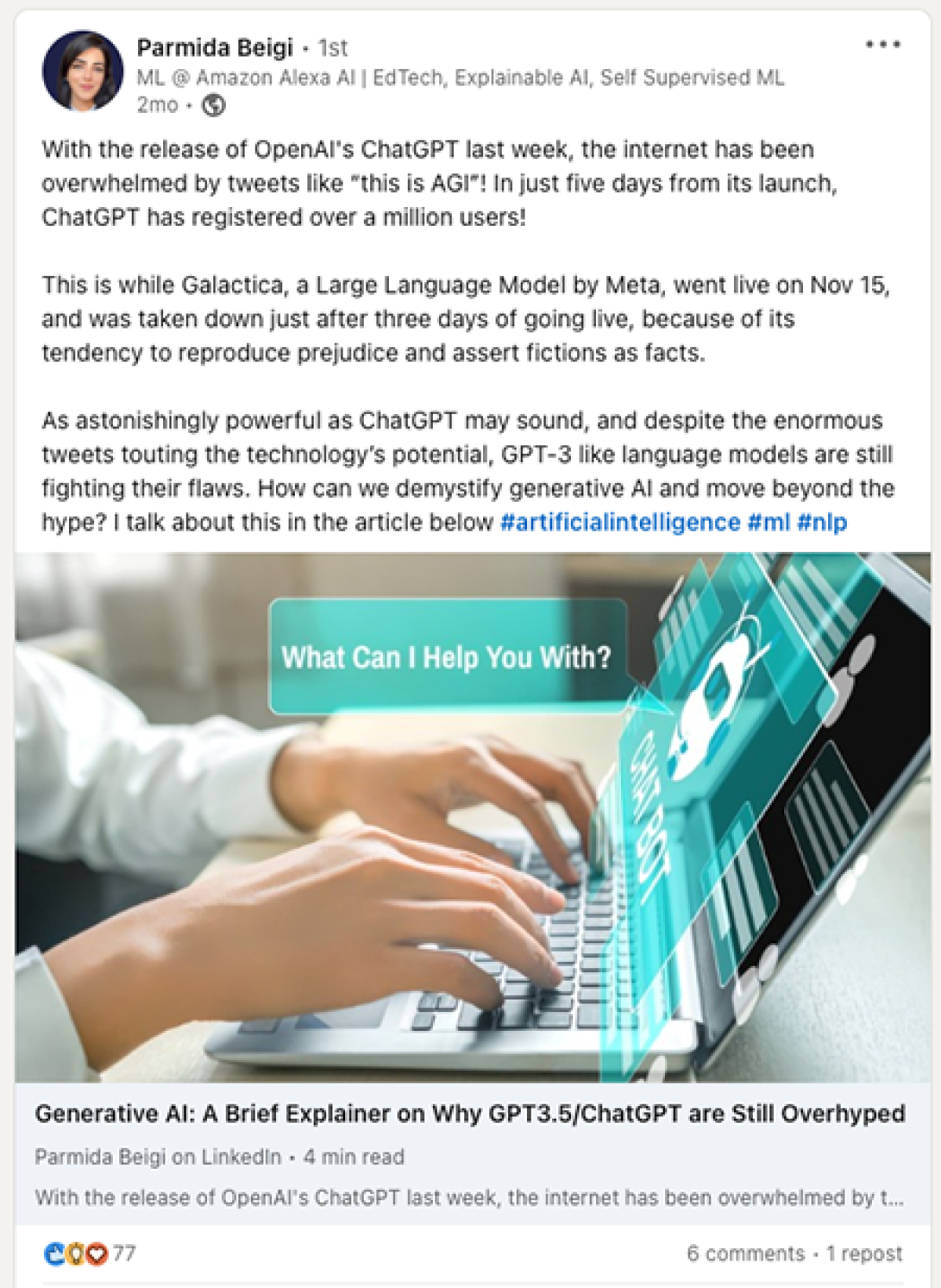Parmida Beigi’s career has touched many facets of machine learning and data science. From her PhD research in computer vision and time series forecasting, to her work in Alexa AI end-to-end systems.
Today Beigi pursues — among other things — speech recognition and natural language processing initiatives to help Amazon’s Alexa customers through her work on the local info team. Beigi has led the work of improving the relevance and ranking of entity search traffic (e.g. queries like “Where is Lions Gate Bridge?”).
As a senior ML practitioner, Beigi says she feels that it’s part of her mission to demystify her field for everyone.
The evidence of her passion for helping others is impressively public. Beigi answers questions and offers practical advice on her popular social media, such as Instagram, LinkedIn, and Twitter feeds. Using simple graphics, quick clips, and the handle @bigdataqueen, Beigi invites followers in to her daily life and expertise as a machine learning scientist at Amazon.
To date, generous knowledge-sharing has garnered her close to 100,000 followers. But her journey to ML scientist/social media maven wasn’t always an obvious one.
At first, she thought she might follow in her family’s footsteps and become a medical doctor. Today, she works on ML/AI projects related to spoken language understanding and information retrieval and ranking. So Beigi relates to people who are figuring out their professional path — not all that long ago, she was doing the same thing.
Discovering data science
In high school, Beigi first focused on science as a stepping stone for pre-med programs. But something was missing. Her natural interests gravitated more toward math and computing, and she began to move in that direction, earning a bachelor’s in electrical and computer engineering.
In college, Beigi took classes that piqued her interest in digital signal processing. While earning her master’s in electrical and computer engineering, she focused her research on compressive sensing, signal processing and image/video processing, which allowed her to hone her skills in a practical setting.
But Beigi hadn’t quite skipped the healthcare field after all. One of her internships involved a research collaboration between the University of British Columbia (UBC) and the BC Cancer Research Center. In that case, the signal processing involved measuring specific biomarkers in patients’ breath with chemo-resistive sensors, and then using statistical methods to seek specific links between lung cancer and smoking habits.
“Back in those days, I didn’t know I was already building foundations for my career in machine learning,” says Beigi.
“The part of signal processing that really interested me was extracting the information embedded in the signals through time-frequency and spatio-temporal representations,” she says, adding that she loved “being able to solve difficult problems and improve human lives.”
Beigi presented her research at the BCCRC Health Sciences Conference and received the best speaker award. This work also resulted in a journal paper published in IEEE Transactions on Biomedical Engineering.
Piqued by machine learning
She continued on at UBC for her PhD in electrical and computer engineering. Her first few years, she was working on computer vision and AI — and found herself increasingly drawn to machine learning.
Every time ML came up at journal paper submissions that she was reviewing, or conferences she attended such as ICASSP and CVPR, she was fascinated by its vast applications, so she started digging deeper.
Thanks for featuring me, KDnuggets: Learning Data Science Through Social Media https://t.co/UPQCQM9dZg ➡️ The original post is here https://t.co/R24n8AV0Qu 🎙 #DataScience #AI @susansivek @kdnuggets pic.twitter.com/LWrLaJGlSu
— Parmida Beigi (@ParmidaBeigi) July 2, 2021
“I read lots of papers, took several online courses and listened to podcasts, even though there were not many at that point — whatever tool I could find,” she says. “I set up my research environment so I could develop simple ML-based methods based on the data that I gathered for my thesis, to see how it would work compared to the conventional rule-based techniques that we were using before.”
She was hooked.
Beigi realized she could learn a lot more about practical machine learning by integrating it into her research, where it could be used to solve a real-life problem.
She started working with two hospitals in Vancouver, Canada, where she found out there was a need to create technology for image-guided procedures that would allow doctors to ensure accurate placement of epidural needles — which is notoriously tricky.
Analyzing a stream of ultrasound images taken from a patient’s back while the anesthesiologist was inserting a needle, Beigi developed a tool using image processing techniques along with time-series analytics and ML to visualize and localize that needle for the doctor.
Beigi published and presented her research at several peer-reviewed journals and conferences, including her ML-based tracking work which was published in the International Journal of Computer Assisted Radiology and Surgery. She was also the recipient of an NSERC Alexander Graham Bell scholarship, awarded to top-tier Canadian PhD scholars.
After defending her thesis, she took a job as an ML scientist at Boeing where she was leveraging her expertise with sensor processing to work on predictive and prescriptive maintenance of Boeing aircraft.
Starting out on social
That’s also when she began her social media journey.
“I started sharing my learnings as a self-taught ML scientist to give back to the community and to empower aspiring tech talents” Beigi says. “I wasn’t really taught ML at school. During my early grad studies, when I was done with my research and teaching duties, I was studying machine learning on my own.”
It’s this personal, DIY experience that makes her content so relatable.
Which university degrees are best for a career in AI or data science? Is self-supervised learning really just a fancy name for unsupervised learning? How do you get started coding machine learning in Python?
Beigi says the most common questions she answers are about how to get into data science and ML, and people asking if they can still get into the field without a PhD.
“Data science is not limited to tech, all industries have started to benefit from data science and AI solutions,” she answers. “Typically, for a DS/ML generalist, you don’t need a PhD or necessarily a degree in computer science or data science, these may only help you get shortlisted, but what matters most is whether you can get the job done.”
She also helps by providing specifics, drilling down into what skills are needed for the job, regardless of degree.
As she expanded her social presence, she also began to consider a move. She knew her next step would be into the U.S. — specifically to Silicon Valley.
She decided to “do more research, gain more targeted knowledge and hands-on practical experience through side projects, and then apply for jobs that were not necessarily closely related to my PhD work, that would challenge me on both the practical and technical side.”
That’s how she ended up at Amazon.
Working at Amazon
Beigi interviewed at a few companies during her job search, and after pondering competing offers, she decided to join Amazon in 2019. More than three years later, she hasn’t looked back.
“While I stayed with the same team for three years, I’ve had the luxury of applying data science across a variety of verticals, which is a part of my experience at Amazon that I really love,” she says. “It’s always Day 1 at Amazon, and customers are at the center of everything we do. Starting with the customers and working backwards, I get to work with end-to-end Alexa components, starting from speech recognition, to natural language understanding, all the way to the final stage where we optimize relevance to best address customers’ queries through learning to ranking techniques.”
Since Beigi joined Amazon, she has been a member of Amazon mentoring program, and has been consistently working on improving the bar for scientific publications as an AMLC reviewer.
“A great data scientist is curious, they look at the science behind everything, the how and why things work, and identify patterns, correlations and causations. Similar to a data science project itself, isn’t it?” she says. “Just like science, data science is a broad term. Find the kind of data science that is right for you — you know more than you think you do.”





















